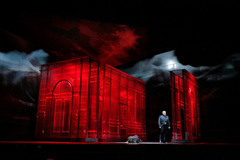| Opera Reviews | 19 April 2024 |
Viva Verdi!by Arlene Judith Klotzko |
|
| Verdi: Otello Metropolitan Opera April 2016 |
|
|
This was Sher’s sixth production for the Met. The stage had as a backdrop two huge panels set at an oblique angle. They formed a screen for Luke Halls’ marvelously evocative images of the sea, threatening skies, and drifting clouds. Images that were particularly moving as Desdemona, achingly vulnerable, prepared for bed in Act IV. The stage was divided up by Es Devlin’s four sliding lucite panels which constantly rearranged themselves. It seemed a clever idea but, unfortunately, the perpetually moving panels called attention to themselves rather than attending to the drama. The sight of stagehands crouching behind them as they pulled and pushed the panels into place added to the distraction. Moreover, the effect of all that lucite was a curious depersonalization which worked against the psychological arc of the opera. Since his assumption of the role in Salzburg in 2008 under Riccardo Muti, Aleksandrs Antonenko has become the go-to Otello. I had seen him twice before – first at Carnegie Hall, under Muti, in a 2011 concert performance and then, a year later, under Antonio Pappano at the Royal Opera House. Both times I thought he was vocally strong albeit rather wooden. The spring 2016 appearance at the Met, which I attended, was preceded by unintended suspense. When he sang the radio broadcast, Antonenko was clearly indisposed and his vocal difficulties only mounted. Just before Act IV was set to begin, he realized he could not continue. His cover Francesco Anile, was pulled out of the green room and hurried onto the side of the stage, wearing street clothes covered by a dark cape. Antonenko mimed the role and Anile sang. With Antonenko still indisposed for the following performance, Anile went on in costume. But it remained unclear until the day of the performance reviewed here whether Antonenko would be well enough to return. He was and he did. He had no vocal difficulties. In what must be one of the most challenging tenor entrances in all of opera, Antonenko delivered a ringing “Esultate.” He sang with clarion tone and unforced power right the way through. While he is certainly not one of opera’s greatest actors, his resigned ” Niun mi tema” was convincing and moving. I was curious to see what Željko Luĉić would make out of the extraordinarily rich role of Iago. All too often when I have seen him on stage he has been dramatically unengaged -- at times to the point that if one did not know what he was singing, one would not know what he was singing about. His Iago was different: he was utterly convincing as a wily, destructive and even satanic Iago but in an understated, non-flamboyant way. The effect was to make his relentless, evil machinations all the more chilling. Of the principal soloists the laurels go to Hibla Gerzmava. She gave a revelatory performance with sumptuous singing as she spun out exquisite phrases with heartbreaking emotion. So in love, so betrayed. And yet so forgiving. Her “Willow Song” and “Ave Maria” were the vocal highlights of the evening. While Verdi and Boito portray her as an innocent even saintly figure, in a costume misstep, Catherine Zuber gave her an opulent red dress more suited to a courtesan. This disjunction was made worse by Zuber dressing everyone else in subdued colors. As usual, the Met Chorus, under choral director Donald Palumbo was superb. They conveyed such a spectrum of moods, by turns thrilling in their fear and trembling, almost otherworldly in their prayer, and simply gorgeous in the flower chorus. Unfortunately Sher did virtually nothing with them visually and dramatically; mostly they just stood around. The Met orchestra under Adam Fischer was simply magnificent. I had never thought of Fischer as a Verdi conductor; indeed, I had never heard him conduct Verdi. It turns out, however, that he made his Met debut in 1994 conducting Otello and three years later returned to the house to conduct Aida. His was a controlled and propulsive reading, fully in accord with the fast moving drama. He was masterful in every dynamic and every texture, producing a wall of sound for the battle in act one and exquisite details throughout the evening. Two particularly breathtaking examples were the solo cello before the love duet and the haunting wind introduction to Act IV.
|
|
| Text ©
Arlene Judith Klotzko Photos © Ken Howard / Metropolitan Opera |

 Bartlett Sher’s new production of Verdi’s penultimate opera, Otello, opened the Metropolitan Opera’s 2015-16 season. It returned in the closing weeks with a new conductor, Adam Fischer, and a new Desdemona, Hibla Gerzmava.
Bartlett Sher’s new production of Verdi’s penultimate opera, Otello, opened the Metropolitan Opera’s 2015-16 season. It returned in the closing weeks with a new conductor, Adam Fischer, and a new Desdemona, Hibla Gerzmava. 





